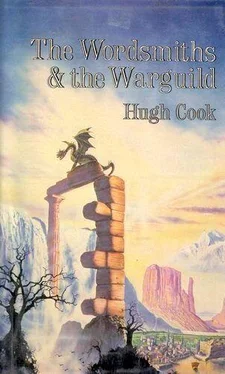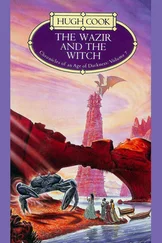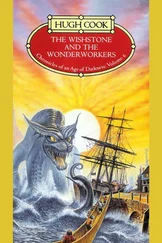Hugh Cook - The Wordsmiths and the Warguild
Здесь есть возможность читать онлайн «Hugh Cook - The Wordsmiths and the Warguild» весь текст электронной книги совершенно бесплатно (целиком полную версию без сокращений). В некоторых случаях можно слушать аудио, скачать через торрент в формате fb2 и присутствует краткое содержание. Жанр: Фэнтези, на английском языке. Описание произведения, (предисловие) а так же отзывы посетителей доступны на портале библиотеки ЛибКат.
- Название:The Wordsmiths and the Warguild
- Автор:
- Жанр:
- Год:неизвестен
- ISBN:нет данных
- Рейтинг книги:4 / 5. Голосов: 1
-
Избранное:Добавить в избранное
- Отзывы:
-
Ваша оценка:
- 80
- 1
- 2
- 3
- 4
- 5
The Wordsmiths and the Warguild: краткое содержание, описание и аннотация
Предлагаем к чтению аннотацию, описание, краткое содержание или предисловие (зависит от того, что написал сам автор книги «The Wordsmiths and the Warguild»). Если вы не нашли необходимую информацию о книге — напишите в комментариях, мы постараемся отыскать её.
The Wordsmiths and the Warguild — читать онлайн бесплатно полную книгу (весь текст) целиком
Ниже представлен текст книги, разбитый по страницам. Система сохранения места последней прочитанной страницы, позволяет с удобством читать онлайн бесплатно книгу «The Wordsmiths and the Warguild», без необходимости каждый раз заново искать на чём Вы остановились. Поставьте закладку, и сможете в любой момент перейти на страницу, на которой закончили чтение.
Интервал:
Закладка:
"Let's be honest," said Togura, speaking aloud. "To tell the truth, I've forgotten."
His voice sounded so forlorn and lonely in that old, dusty hall that he wished he had not spoken. He gave the musical instrument a little kick. He was tempted to break it, but his mercantile instincts restrained him. In context, the triple-harp was a useless piece of junk, but in a cultured city like Selzirk it might well be worth a fortune. Togura put the triple-harp back in its casket. Harp and box were light and easy to carry.
"On your way, Togura Poulaan," said Togura.
He left the hall by way of a high, arched doorway. The floor beneath was paved, not by bricks but by huge slabs of stone.
"Curious," said Togura.
He advanced boldly down the passageway, then stopped when one of the huge slabs of stone seemed to shift underfoot.
"Curiousr still," said Togura, sweating a little.
Cautiously, he started to retreat back the way he had come. But he had taken only two steps when the stone slab pivoted, flipped, and precipitated him into the darkness below. Screaming, Togura fell through the darkness toward a roar of thunder.
Chapter 28
Togura Poulaan, alive and still kicking, floated into the sunlight on the southern side of the castle. He dragged himself ashore and collapsed at someone's feet. Someone's boot nudged him, so he raised himself to a sitting position and looked around.
A fierce young man in wildskin clothes was standing over him. Another man similarly dressed was wading in the river in pursuit of something bobbing away downstream.
"Togura," said Togura, pointing at himself.
"Kogo," said the stranger, slapping his heart.
"Do you speak Galish, Kogo?" asked Togura.
Koko didn't.
Kogo's friend came wading out of the river, bearing his trophy, which was the casked which could only be unlocked by a Word. Togura, after plunging through darkness into the river, had forgotten all about it.
"Togura," said Togura, slapping his heart – he was learning fast.
"Satari," said the stranger, introducing himself. "Seki Natabari Satari."
"Do you speak Galish?"
Satari didn't.
"Another dormant bunch of ignorant savages," said Togura, who felt that life would be a lot simpler if everyone had the decency to learn some Galish.
Satari, failing to open the enchanted casket he had retrieved from the river, passed it to Kogo, who tried to pry it open with a knife, then passed it to Togura.
"Sholabarakosh," said Togura, eager to appease the strangers who, he strongly suspected, regarded themselves as his captors.
The casket opened. He took out the triple-harp, played a few notes to demonstrate its use, then offered it to the two men. They laughed uproariously, and, with air-slapping gestures, declined.
"I'm not a trained musician," said Togura, offended, thinking they mocked his failure to produce a melody.
Still, he was glad that they made it clear he was to keep the triple-harp. He was still thinking of the money it would bring in Selzirk. One of the men scouted away, and before long returned with the rest of the savages. The savages now totalled up to six. The newcomers insisted on hearing Togura play the triple-harp, which he did, provoking copious laughter.
"I still don't see what's funny," said Togura. "I can't be that bad."
The language barrier prevented anyone from enlightening him. Before he had left Sung, he had known, for as long as he could remember, that Galish was spoken everywhere by everyone; it was the universal trading language, the lingua franca of all the world. He had done a lot of unlearning since then.
"When I get back to Sung," said Togura, "I'll teach them a thing or two."
His optimism surprised him. But then, the savages, with their easy laughter, seemed friendly enough.
There was still plenty of daylight, but the savages were in no hurry to go anywhere. They camped by the castle that night; Togura, gaining confidence with the triple-harp, played to them by firelight. The next day, slowed by Togura's sprained ankle, they tramped downriver; toward evening, they reached a large encampment on the edge of rough, rolling lowlands. At this larger camp, there were horses.
As there were no women or children, Togura guessed that the savages were still a long way from home. Without surprise, he found himself put to work gathering firewood, gutting fish, skinning animals, stretching hides to dry, gathering particular types of bark for a use which could not be explained to him, and cooking food. He was also called upon ot play music every evening, and to cut hair. He doubted his own competence as a barber, but nobody objected to the rough and ready hairshaves he managed with a sharpened knife; nobody even laughed.
After a number of days – it could have been as many as twenty, though he could not say, for he soon lost count – they broke camp and moved south on horseback with loads of meat and skins.
Riding south, the savages became tense. They travelled with scouts ahead and a rearguard behind, posted sentries at night and kept their weapons at the ready. Twice they encountered the tracks of other riders, which occasioned excited, animated discussion, and led to increased vigilance. Togura did not have to be psychic to realise that they were riding through enemy territory.
At last they saw a stockade ahead, and, raising whoops and cheers, they charged. Togura at first thought he had been caught up in an episode of tribal warfare, but the gates of the stockade swung open, the citizens within greeted them rapturously, and he realised that this, for the savages, was home.
Very shortly, as he became acquainted with that home, he began to realise the big mistake he had made – and the nature of his present predicament.
Chapter 29
The village, though it was out on the open plains, was a crowded, noisy, smelly place. Lean yellow mongrel curs scavenged, fought and mated in the mud-paved alleyways between the mud-walled huts. Chickens, voicing a persistent chok-chok-chok, strutted about underfoot, their heads bobbing forwards as they walked. Cats and rats played games of pursuit and evasion by day and by night.
Worst were the children. Togura, coming from a remarkably small family, had never had much to do with them. Here they were in abundance. They were everywhere. They screamed, squabbled, shouted, chased the chickens, harassed the cats, made excavations in the mud walls, scratched obscene drawings on the ground, played with dung, pulled each other's hair, stole food, told lies, committed acts of arson, and experimented, with no sense of shame whatsoever, in gang warfare, sex and torture.
By day, the place was largely left to the women, the children and the old people. The men kept to the open plains, hunting, racing horses, and tending the horse herds which were the wealth of the village. Some of the men stayed out for days at a time, guarding the herds or riding their territory on long, military-style patrols, but most retired to the village in the evening, gathering in the village meeting hall to eat, drink, tell jokes, wrist wrestle, throw food at each other, experiment with strange drugs, show off their jewellery – which was only worn indoors – or boast about their weapons and their kills.
Togura slept in a small, windowless annexe to the meeting hall, and nightly attended these gatherings. Nevertheless, he had no place in the society of men. His place was with the women, and the triple-harp, an instrument now hateful to him, was the cause of his exile from masculine affairs.
In Sung, the making of music was stout, hearty, heroic work. At feasts and banquets, sweating, beer-swilling men belaboured the krymbol or blew on the kloo; ancient warriors, bearing the scars from many honourable feuds, tortured the air with the skavamareen; battle stalwarts with walnut-crunching fingers manhandled the thrums. Music making, like drinking, fighting, gambling and rampant fornication, was one of the marks of manhood.
Читать дальшеИнтервал:
Закладка:
Похожие книги на «The Wordsmiths and the Warguild»
Представляем Вашему вниманию похожие книги на «The Wordsmiths and the Warguild» списком для выбора. Мы отобрали схожую по названию и смыслу литературу в надежде предоставить читателям больше вариантов отыскать новые, интересные, ещё непрочитанные произведения.
Обсуждение, отзывы о книге «The Wordsmiths and the Warguild» и просто собственные мнения читателей. Оставьте ваши комментарии, напишите, что Вы думаете о произведении, его смысле или главных героях. Укажите что конкретно понравилось, а что нет, и почему Вы так считаете.












